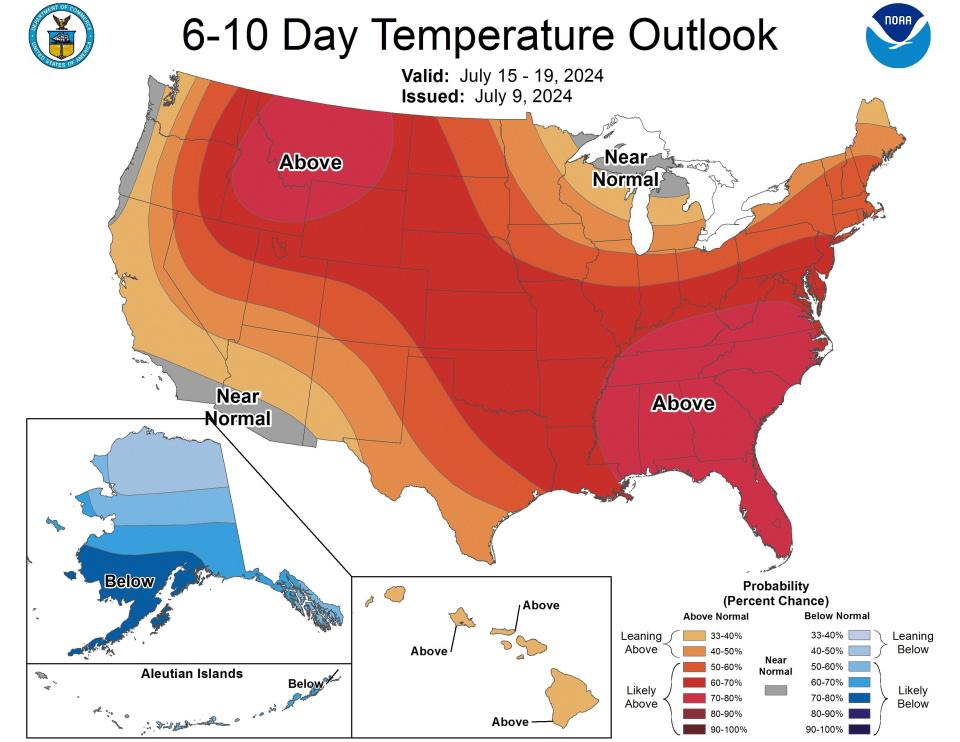Coast-to-coast high temperatures aren’t normal. When will the heat wave be over?
Sure, it's summer and it's supposed to be hot. But not this hot.
Nearly the whole nation has been facing higher-than-usual temperatures amid a weekslong, record-smashing heat wave fueled in part by the warming climate. And forecasts say there's no relief in sight.
"I don't see any drastic change in the weather pattern at this point," AccuWeather long-range meteorologist Paul Pastelok told USA TODAY, adding that above-average temperatures are forecast across the country into the fall.
More than 160 million Americans were under some form of heat alert at some point this week, according to Heat.gov. Oppressive heat has blanketed much of the western U.S. and large swaths of the South, Southeast, mid-Atlantic and southern New England.
"Near all-time high temperature record heat will continue over portions of the Southwest this week," the National Weather Service said. "This long-duration heat wave remains extremely dangerous and deadly if not taken seriously."
It is way too hot. 160 million under alert as heat breaks records and a bridge
Spreading high pressure will lock in high temps
Pastelok said a large, dominant area of high pressure is responsible for the heat in the West, which will spread into the central U.S. by next week. Air sinks underneath high-pressure areas, preventing cooling clouds and rain from forming.
That will cause much of the country to bake under more high heat by the middle of next week.
There aren't a lot of dips and turns in the jet stream now, Pastelok said, so there's nothing to disrupt this pattern.

Maps show weeks of above-average summer heat
Forecast maps from the federal Climate Prediction Center for upcoming days and weeks are all orange and red, signifying above-average temperatures are likely.
According to the prediction center, the weather pattern for next week "favors above-normal temperatures for nearly the entire continental U.S. and Hawaii. The strongest chances for above-normal temperatures are in the Southeast and the northern Intermountain West."
Though summers are always hot, it’s important to remember that the heat events the U.S. and the world are experiencing are far beyond normal.
June was the 13th straight month of record-warm temperatures for the planet, according to data from the Copernicus Climate Change Service. That means every month for more than a year has been the warmest ever recorded. And 2023 was the hottest summer in 2,000 years, a study published last year found.
USA TODAY gets you to the heart of news: Download the app for award-winning coverage, crosswords, audio storytelling, the eNewspaper and more.

Temperatures get a boost from climate change
Unusually warm temperatures on both coasts are getting a boost from climate change, meteorologists Jeff Masters and Bob Henson said on the Yale Climate Connections blog.
"Extreme heat expected today across swaths of the West and the mid-Atlantic was made 400% more likely by climate change, according to an analysis by Climate Central, a nonprofit research group," the meteorologists wrote.
Scientists say heat waves will continue to intensify if the world continues to unleash climate-warming emissions from the burning of fossil fuels.
Contributing: Elizabeth Weise
This article originally appeared on USA TODAY: When will the heat wave be over? Overheated nation begs for cool
